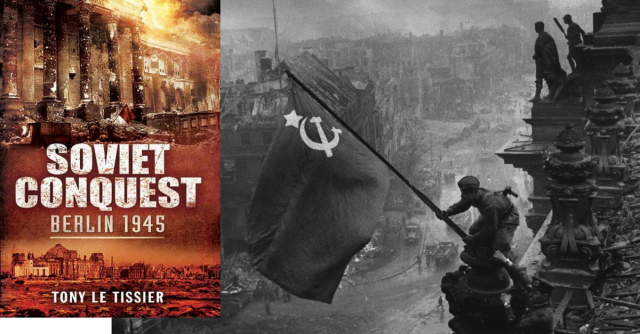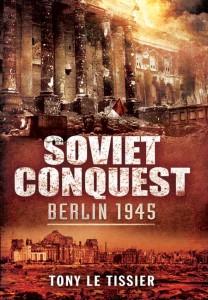The Soviet assault on Berlin was a glorious affair. The iconic (albeit staged) photograph of the Soviet flag being raised atop the Reichstag has come to symbolize the downfall of the Third Reich and the glory of the Red Army. Stalin was vigilant in preserving this “sacred” view of the Berlin offensive. Favoring an “official” history compiled by a team of “experts,” personal accounts from Red Army soldiers were largely banned in the aftermath of the “Great Patriotic War.” It was not until after the publication of Marshal Chuikov’sThe End of the Third Reich in 1964 that memoirs from senior commanders began appearing. While personal accounts from famous generals like Zhukov and Koniev have been available in English for some time, those from their immediate subordinates have not.
Enter Tony Le Tissier’sSoviet Conquest: Berlin 1945. This book is a compilation of memoirs from six high-ranking Red Army commanders: Marshal Katukov, Marshal Babadshanian, Marshal Chartshenko, General Poplavski, General Dragunski, and Lieutenant-Colonel Mironov. A leading expert on the Battle of Berlin and the author of numerous books on the subject, Le Tissier provides the first English translation of these invaluable personal accounts. Averaging 40-50 pages, each account offers a different perspective of the assault on Berlin. Different branches and units of the army are represented. For example, one account deals with the role played by engineers, while others explore the role of tankers, infantry, etc. This gives readers a multifaceted picture of what actually took place during the Berlin offensive—directly from those officers who conducted the operation.
Commander of the 1st Guards Tank Army, Marshal Mikhail Katuov, offers a refreshingly honest account of the Battle of Seelow Heights. Acknowledging “the Front command made a series of errors,” he describes the mishaps Soviet forces experienced while trying to encircle the German capital. The crossing of the Spree River, surprise Panzerfaustattacks from cellars, and brutal building-to-building combat characterize Katukov’s memoir. His anecdotal accounts of courage in the face of death are gripping. Most of the officers’ accounts deal with the capture of the Reichstag in one way or another, and these are arguably some of the most fascinating portions of the book.
A unique perspective is given by Marshal of Engineers, Victor Chartshenko. Commander of the 33rd Independent Engineers, attached to the 1st Byelorussian Front, his men were charged with special duties, such as mine-laying, constructing bridgeheads, and ensuring T-34 tanks had a clear path into Berlin. Whether due to Le Tissier’s translation or Chartshenko’s narrative (or a combination of both), this account of engineering tasks is more captivating than might be expected.
One of strengths of this book is that readers gain insight into how the Soviets perceived the Battle of Berlin. And yet, readers will find themselves questioning to what extend propaganda fills the pages. For example, there is no reference to the widespread rape of German women by Red Army troops. In fact, Marshal Babadshanian waxes eloquent in his description of “the spirit of humanitarianism” that guided troops in discriminating “precisely between the Germans [civilians] and the Fascists.” He continues, explaining how “Our soldiers helped the women and their children out of dangerous areas and shared [our] rations with them.” Undoubtedly, there were occasions where Red Army soldiers demonstrated goodwill toward Berlin civilians, but readers can’t help but wonder how much “spin” has been added to sections of these memoirs. By the same token, however, readers will be struck by the confidence these officers had in the Soviet system. Their sincerity of belief comes shining through. For these men, the “Great Patriotic War” was just that—a great and noble struggle against fascist invaders.
Soviet Conquest is fantastic. The accounts are straightforward and engaging, making this book accessible to scholars and casual readers alike. Maps are also included, which is helpful in understanding how and where the battle unfolded. As primary source material, this book is invaluable. Long banned in the Soviet Union, these six memoirs shed new light on the Battle of Berlin. This collection is a vital addition to research on the Berlin offensive. It will be interesting to see how historians handle these sources, and how these accounts shape historical approaches.
As great as this book is, I was disappointed in being unable to learn precise information about the actual sources. This is the book’s only flaw. The most information I could find comes from the introduction, where Le Tissier states the memoirs are “taken from the East German editions of the original Soviet publications…” That is it. That is all we have to go on. There are no footnotes; there is no bibliography to indicate which archive these sources were pulled from. I found this odd. Furthermore, there seems to be no way of discerning when these memoirs were written. No dates are provided. Were they written immediately after the war, or thirty, forty, or fifty years later? Who knows. Because I loved the book, this was frustrating. But aside from this issue, Soviet Conquest is a great read. Of course, one has to be discerning—shades of opinion, bias, and even propaganda are woven throughout. Still, in terms of understanding how the Soviets fought their way into Berlin, and perceiving the conflict from their point of view, this book is outstanding and highly recommended.
Reviewed by Nate Sullivan for War History Online
SOVIET CONQUEST
Berlin 1945
By Tony Le Tissier
Pen & Sword Military
ISBN: 978-1-47382-110-1


